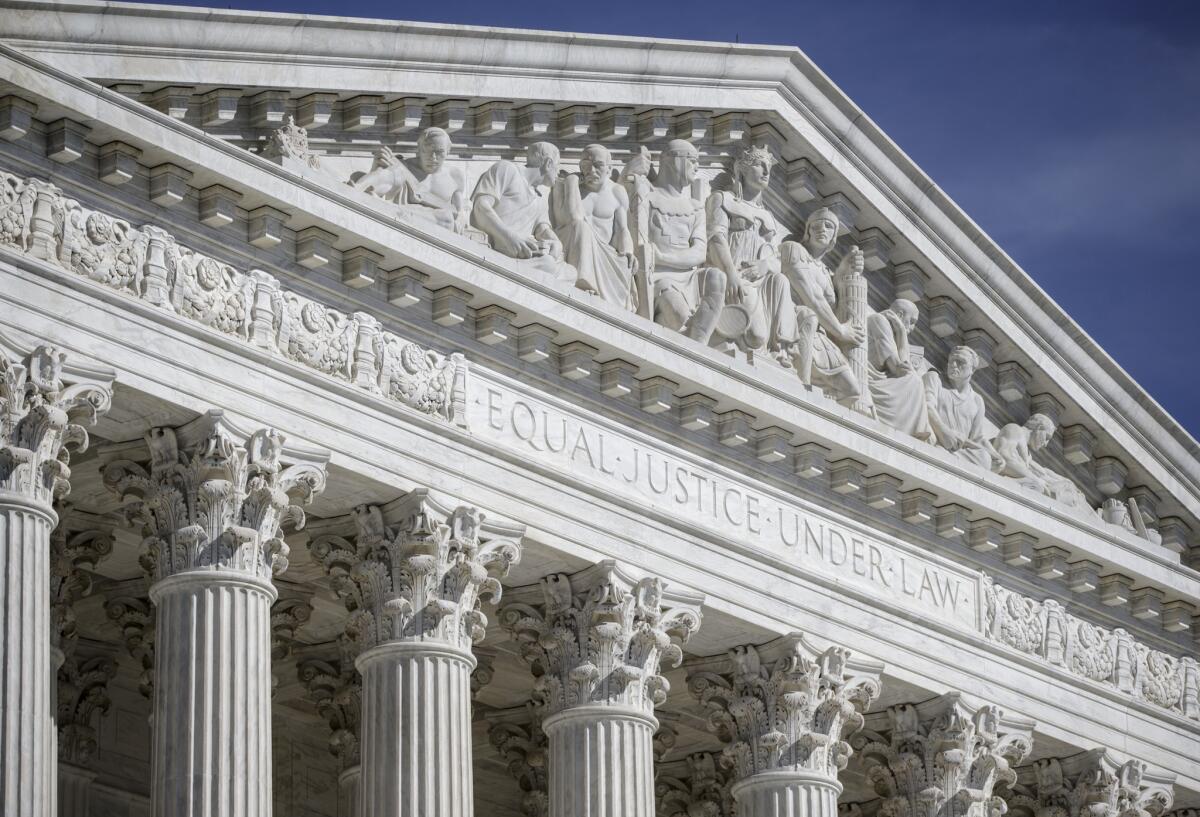Supreme Court refuses for now to block Texas voter ID law

The west pediment of the U.S. Supreme Court building in Washington.
Reporting from Washington — The Supreme Court has refused for now to block a strict voter identification law in Texas that critics say will make it harder for as many as 600,000 registered voters who lack driver’s licenses to cast a ballot this year.
The justices turned down an appeal from civil rights lawyers who said the court should put on hold the requirement for showing a driver’s license or U.S. passport.
They cited three separate rulings in which a federal judge and two appeals court panels said the Texas law violated the Voting Rights Act because it has a discriminatory effect on blacks and Latinos.
But the law has remained in force while the full U.S. 5th Circuit Court in New Orleans weighs the state’s appeal.
In Friday’s order, the high court said it would be open to considering another emergency appeal if the 5th Circuit has not ruled by July 20.
“The Court recognizes the time constraints the parties confront in light of the scheduled elections in November 2016,” the justices said. “If, on or before July 20, 2016, the court of appeals has neither issued an opinion on the merits of the case nor issued an order vacating or modifying the current stay order, an aggrieved party may seek interim relief from this court by filing an appropriate application.”
The order reads like a compromise between the justices who think the Texas rule should be blocked and those who would uphold it.
Despite the court’s decision, a lawyer who filed the appeal said he was pleased with the deadline set by the justices.
“We’re very encouraged that the U.S. Supreme Court recognizes the time constraints involved in this case,” said Gerry Hebert, executive director of the Campaign Legal Center. “We believe the 5th Circuit has set up a schedule that may well foreclose the ability to obtain relief in time for the presidential election. This order gives us the opportunity to protect Texas voters if the 5th Circuit fails to rule in time.”
See more of our top stories on Facebook >>
The Texas voter ID law is one of several voting-rights challenges that are likely to be appealed to the high court prior to the election.
Last week, a judge in North Carolina upheld that state’s new limits on registrations and early voting, but civil rights lawyers said they would appeal.
Prior to 2011, Texas required its registered voters to show proof of their identify when they visited a polling place. But that year, the Republican-controlled Legislature tightened the law by limiting the types of identify cards that would be accepted.
Voters who had a valid Texas driver’s license, a U.S. passport or a concealed handgun permit could cast a ballot. Those who had other types of identification, including local, state or federal employee or student IDs, would not be allowed to vote.
Civil rights lawyers sued, alleging that more than 600,000 of the state’s registered voters, or about 4.5%, did not drive a car or have a passport and would have a hard time obtaining one.
The Texas law requires these voters go a state motor vehicles bureau office with a copy of their birth certificate. For many, doing so would require a trip of more than 100 miles, opponents said.
On Twitter: @DavidGSavage
ALSO
Whitey Bulger’s girlfriend gets 21 more months in prison
Alabama city targets transgender people with bathroom ordinance
Lawmakers say they’re fixing roads and fighting drugs and diseases. They just won’t pay for it.
More to Read
Sign up for Essential California
The most important California stories and recommendations in your inbox every morning.
You may occasionally receive promotional content from the Los Angeles Times.











